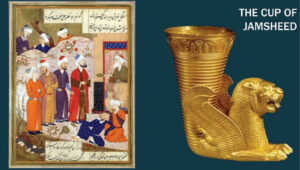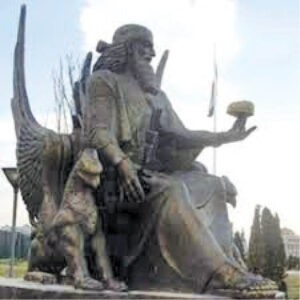According to legend, it was the great Shah (King) Jamsheed of the pre-historic Peshdaad dynasty, who initiated the tradition of celebrating the spring festival of Navruz (New Day). This day marks a new beginning with celebration and contemplation for a better tomorrow for this world. Therefore, let us study the persona of Shah Jamsheed and reflect on why his name has been immortalized in our Zoroastrian tradition. Not just Zoroastrian scriptures, his persona, albeit under different names, is also reflected in the Veda and the Book of Genesis, in the Old Testament.
While poet Firdausi Toosi in his Shah-nameh (the Book of Kings) has immortalized Shah Jamsheed as one of the most glorious kings of pre-historic Iran (the Peshdaad era), one also finds details about the life and deeds of Shah Jamsheed in the second Pargarad (chapter) of the Vendidad. The first half of this chapter in the Vendidad describes how Shah Jamsheed was offered the role of ‘prophet’ by Ahura Mazda, but he declined, pleading his inability to take up such an onerous task. Shah Jamsheed, however, agreed to expand habitation on earth, as instructed by Ahura Mazda. For this task, he received a golden seal and a golden sword as insignia of Royalty. The Vendidad states that Shah Jamsheed expanded the then existing habitation by one third, three times.
The Avesta describes Jamsheed as Khshaeta (fair) and Vanthwa (of good flock) and as one who possessed Divine Khoreh (Glory). According to legend, Sarosh Yazata inspired Shah Jamsheed to start wearing the Kushti (sacred girdle) and also make his subjects wear the same.
The second half of the chapter in the Vendidad elaborates how Ahura Mazda warns Shah Jamsheed of a very severe winter (probably the Ice age) and instructs Shah Jamsheed to build a Vara (probably a subterranean enclosure) and preserve therein, the best among human, animal and vegetation, till the long winter or ice age ran its course of time.
One finds a reflection of this, albeit with variations in the Veda as also the Old Testament. In the Veda, Shah Jamsheed’s role is performed by Manu, and in the Book of Genesis, by Noah. Also, instead of a severe winter, the reference in the Veda and Book of Genesis is to a deluge or a great flood that engulfed earth, and while Jamsheed built a subterranean enclosure, Manu and Noah built a boat.
Jamsheed And Manu…
Manu is derived from the Sanskrit term, ‘maanav’ meaning ‘mankind’. As per Hindu tradition, Manu is the father of mankind or the first man of the current yuga or age. Just like Shah Jamsheed, Manu is considered to be the first ‘law giver’. Jamsheed was a leader of the Peshdad era. The term ‘Pesh’ means first or foremost and ‘dad’ or ‘daat’ means law. In other words, Shah Jamsheed was among the ‘first law givers’.
While Shah Jamsheed divided the society of his time into four classes – Arthravan (Priest); Rathaestar (Warrior); Vastryoshan (Trader); and Hutokshan (Artisan), Manu did likewise by creating the four classes – Brahman (Priest) Kshatriya (Warrior), Vaisya (Trader) and Sudra (Artisan).
Before the great flood, Lord Vishnu appeared before Manu in the form of a small fish (matsya). As instructed, Manu placed the fish in a water pot but when it grew big, he transferred it to a river. When it grew even bigger, he moved it to the ocean. While Shah Jamsheed grew the existing habitation three times, Manu transferred the growing fish three times; and when the great flood came, Lord Vishnu – the Preserver, in the form of a fish, helped navigate Manu’s boat to safety.
Jamsheed And Noah…
Noted German scholar, Prof Friedrich Spiegel opined that the ‘Book of Genesis’ borrowed heavily from the Avesta. How so? While Shah Jamsheed is believed to have lived for one thousand years, Noah is said to have lived for nine hundred and fifty years. Ahura Mazda instructed Shah Jamsheed to cultivate earth and so did the Lord instruct Noah to cultivate earth. Ahura Mazda warned Shah Jamsheed about a severe winter and instructed him to build a Vara (enclosure) while Noah was warned of a great flood and instructed to build an Ark. Finally, when the flood receded, Noah built an alter to God while Shah Jamsheed, after the severe winter, installed the Great Fire of Adar Frobag on Mount Gadman-homand.
Lessons And Inspiration From The Story Of Shah Jamsheed…
The Shah Nameh says there were no illnesses during the era of Shah Jamsheed, indicating that health and sanitation were top priorities. There was prosperity and so much growth, that the king expanded the boundaries of his kingdom thrice over. Arts and crafts flourished. Even the discovery of wine is attributed to his era. King Jamsheed also possessed the fabled Jaam-e-Jamsheed (goblet of Jamsheed) with which he gazed into the past and the future. Perhaps it was an ancient scientific instrument or an observatory to study the stars and planets and their effect on events of the past and future on earth.
Shah Jamsheed was both, King and Priest, and sought Divine guidance of Ahura Mazda and Sarosh Yazata virtually throughout his long rule. When the ice age set in, he was divinely guided to create a Vara (enclosure) on a mountain and save Ahura Mazda’s good creations from destruction. Indeed, Shah Jamsheed was devout and committed to progress and prosperity. However, it was Divine Power that aided Shah Jamsheed in attaining success in the welfare and developmental works that he undertook. It was not the welfare and developmental works that he undertook that aided Jamsheed in attaining Divine Power.
Also, as long as Shah Jamsheed used power for the good of his people and more importantly, with humility and grace, he was loved, respected and could keep his Khore or Divine Power. But, when pride or ego entered his heart, he not only lost the love and respect of his people, he also lost his Khore. He was left bereft of power or position.
Arrogance Leads To Downfall…
According to the Shah Nameh (the Book of Kings) when Shah Jamsheed virtually ushered Frashokereti (or making this world wonderful, excellent and near perfect), he proclaimed in his court, words to the effect: “I think that there is no one in this world like me. I am unique. I have bettered this world and alleviated all pain and suffering. Skills and trades are flourishing in this world because of me. Life and awareness of life of my subjects is thanks to me. It’s by my grace that my people have good clothes to wear and good food to eat. I should be recognized by my people as their God.” The Shah Nameh states that as soon as he uttered these conceited and egoistic words, his Khore left him in the form of a bird. Shah Jamsheed lost his Divine Power and all other worldly powers.
 It further states, not only did Jamsheed’s subjects forsake him, they went in search of a new leader and found Zohak. It is a classic case of ‘arrogance before the fall’ and ego extinguishing all the good achieved.
It further states, not only did Jamsheed’s subjects forsake him, they went in search of a new leader and found Zohak. It is a classic case of ‘arrogance before the fall’ and ego extinguishing all the good achieved.
The story of Jamsheed helps us understand that power is necessary for progress and prosperity. But power must be attained through the right use of knowledge and application of wisdom with humility. Pride, to an extent, is legitimate and positive. But arrogance is undesirable and negative.
As long as Shah Jamsheed focused his attention on his people and stayed devout, there was glory for him, his people and the world. The moment his attention moved from Ahura Mazda’s Will and his people to his own self, where he began thinking he was all powerful, his fate was sealed. His Khore or divine power left him and with that, he lost all power and position.
Positive Affirmations…
 This Navroze, let us resolve to be more humble, more giving, more devout, more grateful and more attuned to the Will of Ahura Mazda. We, as a community, have been blessed with a lot. Let’s be grateful for what we have. Let us cultivate an ‘attitude of gratitude’.
This Navroze, let us resolve to be more humble, more giving, more devout, more grateful and more attuned to the Will of Ahura Mazda. We, as a community, have been blessed with a lot. Let’s be grateful for what we have. Let us cultivate an ‘attitude of gratitude’.
Navroze Mubarak! May the warmth of spring warm our hearts with feelings of empathy instead of entitlement! May we give more this year instead of asking for more! May we find contentment and consider good health as our greatest wealth! May we build more bridges of good relationships as opposed to burning them! Above all else, may we all play our role, no matter how small, in making this world a happy place to live in!
- Celebrating Motherhood - 11 May2024
- Parsi Thy Name Is Humour! - 4 May2024
- The Poison of Pessimism - 27 April2024
